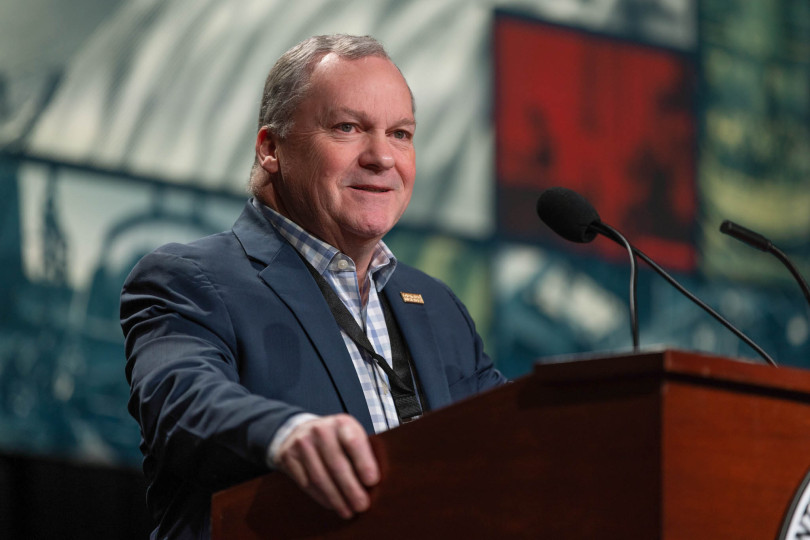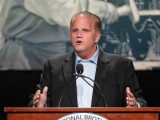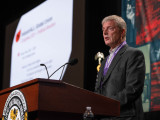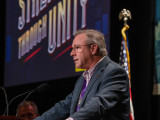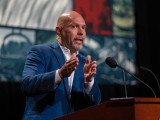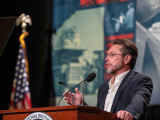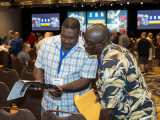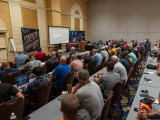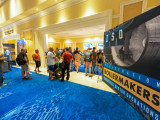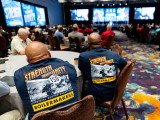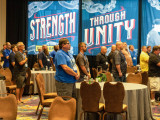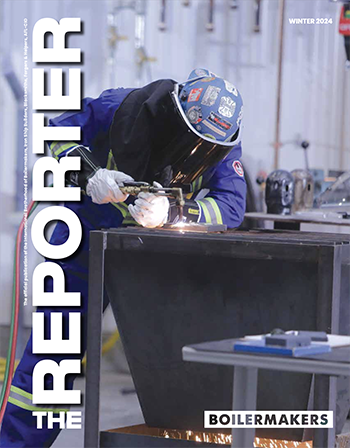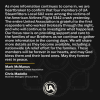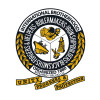“Being here, you’re investing in your local’s future. This conference is unique; where you’re really going to learn is from each other.”
IVP-SE Warren Fairley gives the opening address at the 2022 ISO Conference in Las Vegas.
View Photo Gallery (12 photos)
As with most Boilermaker gathering since 2019, Industrial Sector Operations leaders were thrilled to meet again in person after a forced break due to the COVID-19 pandemic. The ISO Conference took place Aug. 30 to Sept. 1 in Las Vegas, where members heard from leaders from across the industrial, metal trades and railroad sectors.
In addition to attending plenary sessions, members gathered information and gained insight to take back to their locals in industry-specific caucuses and breakout sessions. Breakouts featured information on in-plant organizing for the ISO sector; basics for financial officers; legal rights of stewards; pension and annuity updates; effective grievance preparation; the Railway Act history, lodge communications and additional topics.
IVP-SE Warren Fairley opened the conference on behalf of International President Newton B. Jones.
“It’s certainly nice to be back after the last few years and all the delays due to the pandemic,” he said. “Being here, you’re investing in your local’s future. This conference is unique; where you’re really going to learn is from each other.”
Fairley honored members of Local 146 in Edmonton, Alberta, noting that during the two-year lock-out of 30 L-146 members, the picket at CESSCO stayed active the entire time due to the diligence of several Boilermakers. He named one member in particular.
“Brother [Ray] Mudryk was on the line with his brothers every day,” Fairley said. “One morning, he got out of his truck to join the picket line, he collapsed, and sadly he passed away. He died in solidarity, fighting for what simply should be right and fair in his workplace.”
Fairley said there was a hearing set for September regarding CESSCO’s unfair labor practices. “We are going to stand up and fight this fight to the very end. Because whether you work in a fabrication shop in Edmonton, Canada, shipyard in Mississippi, a cement plant in Kansas or you keep the ferry boats afloat in Seattle, we’re all here for the same reason: We’re Boilermakers, and we are here to build our brotherhood.”
AFL-CIO Metal Trades Department President James Hart brought good news to members, outlining several wins for metal trades workers over the last few years, including helping to save Philly Shipyard in Philadelphia.
“When you close down your industry, you’re closing down jobs and pensions. We saved the Philly Shipyard. You did that.”
“When I came to the department, they told me the Philly Shipyard was going to close,” Hart said. “But I couldn’t buy that and Warren [Fairley] couldn’t buy it. [IP Jones] couldn’t buy it. But people just said that’s the way it is.”
Since then, workers at Philly Shipyard have built four new ships with a fifth one on the way. With 1,400 current workers—soon to be 2,000—Hart said the shipyard is going to be around for generations, and it’s due to the work of Local 19 (Philadelphia).
“When you close down your industry, you’re closing down jobs and pensions. We saved the Philly Shipyard. You did that,” he said.
The Metal Trades Department is seeking to create jobs in Lordstown, Ohio, for submarine repair and is working with companies to create more jobs for workers in other states.
“The metal trades are in the air, on the ground and in the sea,” Hart said. “That could not be said seven years ago. Now we recognize our potential. We work together with the building trades every way we can. The bottom line is that together we are stronger. Nothing divides us as much as our union bonds unite us.”
IndustriALL General Secretary Atle Høie detailed the rights of workers across the globe and the work being done to organize workers in other countries to advocate for safe and fair jobs.
“If our workers have the right to organize, they will be able to get secure and healthy workplaces,” said Høie, noting the least organized place in the world are the U.S. southern states.
Lack of workplace safety in developing countries cause harm to workers. A perfect example of that is the tragedy that occurred in Bangladesh where 1,134 people died and 2,500 were seriously injured during the collapse of Rana Plaza, a company site where clothing is manufactured. Høie said IndustriALL helped to broker the Bangladesh Accord, a legally binding agreement with 175 brands. Now these facilities have independent inspections and programs for improvement, including safety training.
Ship breaking is another industry causing death and harm to workers. “When the ships are old enough to go out of business, they re-register the ships under different flags and tow them to beaches in Bangladesh, Pakistan and India,” Høie said.
Workers dismantled the ships with no safety equipment or training. But in 2008, companies started safety training and put pressure on authorities to demand good working conditions and health and safety.
“Now there are medical and training facilities on the yards in India so people don’t die anymore,” he said. “When the international community comes together, they get things done.”
Michael Baldwin, president of the Brotherhood of Railroad Signalman, told members the last few years have been hard on the industry.
“Our craft, like those across the industry, has lost members as railroads demand more with less.”
“Our craft, like those across the industry, has lost members as railroads demand more with less,” Baldwin said.
Boilermaker members and all rail members are important first line workers and they haven’t had a contract since 2019. Baldwin said the railroads, driven by hedge-funds, were not motivated to negotiate fair contracts with rail workers, so when workers and railroads couldn’t come to an agreement, it went to the Presidential Emergency Board. Baldwin said the “recommendations were lackluster.”
He said railroads have never shown “good faith” in negotiations. “If we strike, Congress will probably step in,” Baldwin said. “Even a two-hour strike will affect supply chain issues for at least two weeks. We were the ones that kept the supply chain going through the pandemic. Labor’s focus must be long-term. We must plan for the next five, 10, 15 years.”
The event’s keynote speaker was Eric Maddox, a former U.S. special operations soldier who was an interrogator sent to the Middle East to hunt down Saddam Hussein after terrorists attacked the Twin Towers in 2001. During interrogations he learned the best way to get to people is to actively listen to them. And it doesn’t just work when interrogating someone, listening works in all critical conversations, including in contract negotiations, he noted.
“In the critical conversations we have, are we really listening or are we just seeking to fulfill our own objectives?” Maddox asked. “When we’re going into a negotiation, we have to understand where they’re coming from. When we solve their problems first, they’re dying to solve ours.”
Delegates also heard from Robbie Hunter, the president emeritus of the California State Building Trades and Construction Trades Council, who addressed the need for strong refineries and discussed the fact that when NAFTA was implemented, “the industrial base of America was cut at the knees.”
Director of Government Affairs Cecile Conroy gave an overview of legislative issues pertaining to the Industrial Sector. She said there have been several bills, such as the Inflation Reduction Act, passed that could have significant potential across all sectors.
“I was shocked at how much, in the House and Senate, hydrogen has taken off as the new fuel,” Conroy said. “That’s good news for Boilermakers. We’re excited about the potential in getting hydrogen off the ground.”
AD-ISO Don Hamric, who gave closing conference remarks, reiterated that the week was for connection and training. “My hope is that you will leave here with renewed energy, understanding and support for what your union does, what it stands for and how you continue to contribute to our success.”
He said when working people come together, they aren’t just powerful—they’re unstoppable.
“We should be proud of what we’ve achieved together,” Hamric said. “We’ve had organizing successes in Ohio and Texas, regained our work at Philly Shipyard, scored a great new contract at Vigor in the Pacific Northwest and won against Aggregate Industries’ attempt to shut us out in West Virginia. Thank you for what you’ll do over the next months and next year to make your local, our union and our brotherhood stronger.”
